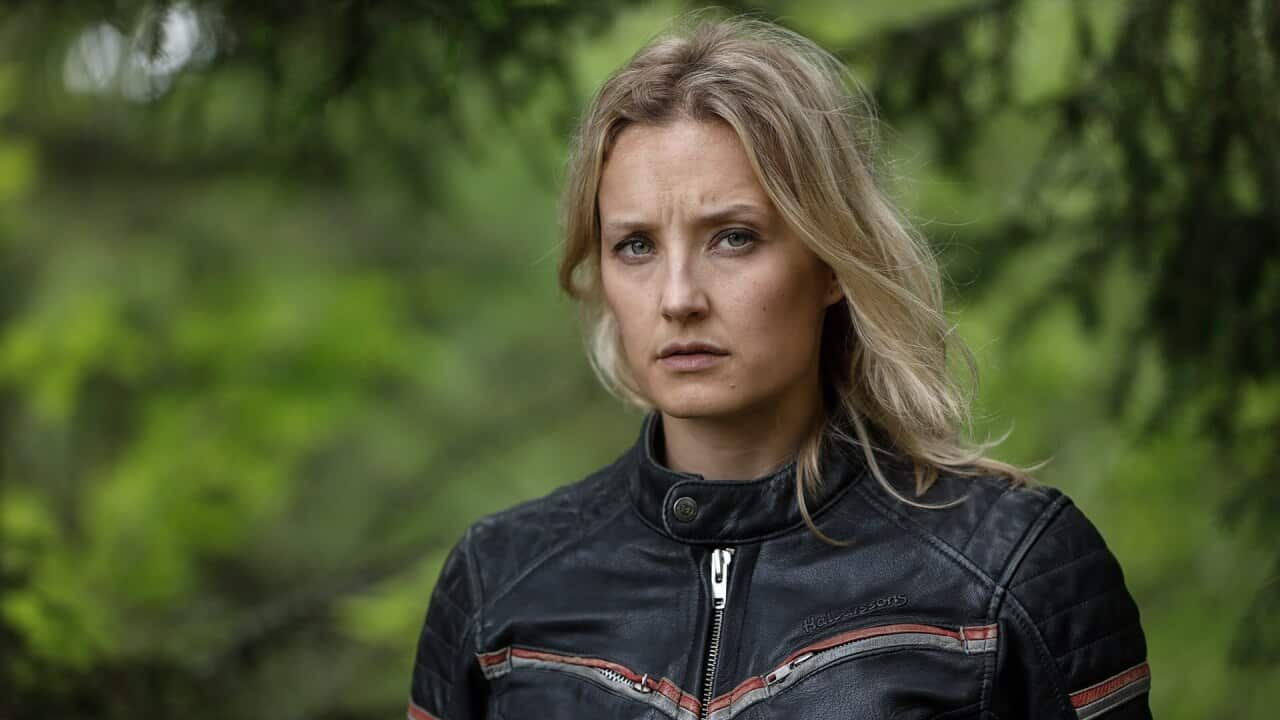The hero of Furia, Ragna, is the Dana Scully of fighting far-right extremism. She's cool, she's strategic, she's determined. This is a series that quickly sucks you in with clever layers of identity, conflicted allegiances, murder mystery and political intrigue.
Ragna anchors the interweaving plotlines, both personal and political. At risk are her own life, and the security of Europe. Ragna (Ine Marie Wilmann) meets her accomplice midway through the first episode. Asgeir (Pål Sverre Hagen) has escaped his past life as a special ops officer to raise his daughter in Norway. His wife, and his daughter's mother, was killed in the line of duty. When he arrives to work with the local police in what – superficially – looks like a peaceful, nondescript regional town in West Norway, it's soon clear that evil is lurking.
Ragna (Ine Marie Wilmann) meets her accomplice midway through the first episode. Asgeir (Pål Sverre Hagen) has escaped his past life as a special ops officer to raise his daughter in Norway. His wife, and his daughter's mother, was killed in the line of duty. When he arrives to work with the local police in what – superficially – looks like a peaceful, nondescript regional town in West Norway, it's soon clear that evil is lurking.

Ine Marie Wilmann as Furia. Source: Monster X Films
Beginning with what appears to be a race-related murder case, Asgeir is launched into a web of terrorism plots, racism and division between the town's refugee centre and local youth. For all his expertise and charm, Asgeir is not as charismatic nor heroic as Ragna. But who is this cool, smart, quiet woman who says so little at first and trains diligently, military-style, in the home gym she's assembled? There's a rigorousness to her athletic training and the sharp way she observes the men around her that indicate she is hunting something, on alert. When her cover is blown by the new cop in town, Ragna reveals her secret identity to Asgeir. She has adopted the persona of Furia, an extremist spreading far-right propaganda and sensationalist opinions to her worldwide audience. She comes to the ugly realisation that she has underestimated the violent storm of hate that has been threatening to unleash its fury upon Europe. The radical terrorist groups she has infiltrated online reveal attacks planned to destabilise Europe and result in mass deaths.
When her cover is blown by the new cop in town, Ragna reveals her secret identity to Asgeir. She has adopted the persona of Furia, an extremist spreading far-right propaganda and sensationalist opinions to her worldwide audience. She comes to the ugly realisation that she has underestimated the violent storm of hate that has been threatening to unleash its fury upon Europe. The radical terrorist groups she has infiltrated online reveal attacks planned to destabilise Europe and result in mass deaths. There is a surge of urgency from the moment Ragna and Asgeir confide their true identities to one another. It is no coincidence that they are here, at the epicentre of a discreet terrorist cell, with merely weeks until the German election in which kamikaze radicals intend on wreaking destruction.
There is a surge of urgency from the moment Ragna and Asgeir confide their true identities to one another. It is no coincidence that they are here, at the epicentre of a discreet terrorist cell, with merely weeks until the German election in which kamikaze radicals intend on wreaking destruction.

'Furia' Source: Distributor

Pål Sverre Hagen as Asgeir Source: Distributor
The new terrorists are not camouflage-wearing, gun-wielding, shaven-headed gangs with loud slogans and logos to signpost their political beliefs. They are quietly plotting, insidiously finding ways to communicate globally under the radar of authorities. They are recruiting disenfranchised youth, spreading false truths through video, lectures and imagery. They are offering a sense of community and inclusivity in a world that favours affluent white men in business, politics and culture. They are infinitely harder to identify, to observe, and to stop.
It will require an intellectual approach, determined and fastidious minds, technology and cross-nation cooperation. These are a new breed of terrorist, and it requires a new breed of intelligence to counterattack.
Ragna is the new breed. She is not the burly hero of comic book films, nor a female version of the suave super-spy Jason Bourne. She more closely resembles Homeland's Carrie Mathison, with her intelligent, diligent commitment to the security of her nation and the integrity of global security. Perhaps, too, she reflects the cool, determined and singular focus of The Killing's Sarah Lund (). She is extraordinary and flawed at once, a heroine who is humanly relatable.
The plot is relatable too, as dramatic and unbelievable as it sounds. The story was grounded in the very real Norway attacks of 2011. Referred to as 22 July (or 22/7), they involved two domestic anti-government attacks by Anders Behring Breivik, killing 77 civilians, including those at a Workers' Youth League summer camp.
As Furia makes eminently clear from beginning to end, there is no safe place and our future rests largely with intelligent insiders willing to go to the dark corners of the web most of us aren't even aware exist. If our survival depends on someone like Ragna, that's some comfort.
See eight-part series Furia Wednesday nights at 11pm from 29 March on SBS. The full season is also streaming at .






